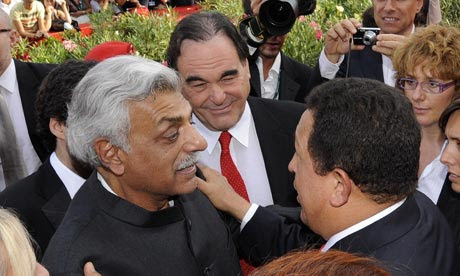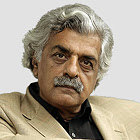Oliver Stone and Tariq Ali: brothers in arms
丘延亮
Oliver Stone and Tariq Ali: brothers in arms
Eighteen months ago, Tariq Ali got a call from Oliver Stone: could he help with his new film? The result was a powerful documentary about Latin America – and a new friendship

Almost a year and a half ago I received a phone call from Paraguay. It was Oliver Stone. He had been reading Pirates of the Caribbean: Axis of Hope, my collection of essays on the changing politics of Latin America, and asked if I was familiar with his work. I was, especially the political films in which he challenged the fraudulent accounts of the Vietnam war that had gained currency during the B-movie years of Reagan's presidency.
- South of the Border
- Production year: 2009
- Countries: Rest of the world, USA
- Cert (UK): 15
- Runtime: 78 mins
- Directors: Oliver Stone
- Cast: Hugo Chavez, Tariq Ali
Stone had actually fought in that war as a US marine, which made it difficult for others to pigeonhole him as a namby-pamby pacifist. Many of his detractors had avoided the draft and were now making up for it by proclaiming that the war could have been won, had the politicians not betrayed the generals. This enraged Stone, who detested the simplistic recipes now on offer on every aspect of American domestic and external politics. In the original Wall Street (1987), for instance, he had depicted the close links between crime and financialised capitalism that ultimately led to the crash of 2007.
The Vietnam war played a large part in shaping Stone's radical take on his own country. One of JFK's most striking scenes, almost 10 minutes in length, portrays a talking-heads duo: Jim Garrison (Kevin Costner) and an unidentified military intelligence officer (Donald Sutherland) are walking by the Potomac river in Washington DC, discussing who killed Kennedy. The Sutherland character links the president's execution to his decision to withdraw US troops from Vietnam some months previously. For me, it is – together with the depiction of French officers calmly justifying torture in Gillo Pontecorvo's classic Battle of Algiers, and the Greek far-right plotting to kill the leftwing deputy Lambrakis in Costa-Gavras's Z – one of the three finest scenes in political cinema.
A steady flow of jeremiads from critics on the left and the right denounced this particular scene in Stone's JFK as pure fantasy. Later research, however, including the recently published biography of one of the Kennedy administration's leading hawks, McGeorge Bundy, has overwhelmingly vindicated the director's approach. Kennedy had indeed decided to pull out – largely on the advice of retired General Douglas MacArthur, who told him the war could never be won.
Stone's refusal to accept establishment "truths" is the most important aspect of his filmography. He may get it wrong, but he always challenges imperial assumptions. That is why he was now in Paraguay, talking to the new president – a defrocked bishop weaned on liberation theology, who had succeeded in electorally toppling the long dictatorship of a single party. Fernando Lugo had become part of the new Bolivarian landscape, one that included Hugo Chávez in Venezuela, Evo Morales in Bolivia, Rafael Correa in Ecuador, flanked by the Kirchners in Argentina and defended by Lula in Brazil.
Stone asked whether we could meet to discuss his most ambitious project, a nine-hour documentary series entitled The Secret History of America. A month later, we met up in Los Angeles. He explained why he felt this project was so necessary. There was a shocking lack of information in the country about its own past, he said, let alone the rest of the world. The receding memory of US citizens was not an accident. "For decades now the kids are either being taught rubbish prepackaged as history modules or nothing," he told me. He regarded this television history as being, in some ways, his most important work. It would present a historical narrative of the United States and how it became an empire. He interviewed me on film for seven hours with a few breaks for water (both drinking and passing). Some of my books were by his side, heavily underlined. It was a stimulating experience, devoid of melancholy or sentimentality on either side. He had a job to do and got on with it.
An unpromising rough cut
Until then, I had assumed that Stone's recent tour of South America was part of the Secret History, but this turned out not to be the case. Angered by the crude assaults on the new leaders by US television networks, as well as the print media (the New York Times was a serial offender), Stone had decided to offer the much traduced elected politicians a voice. But he and his producers, Robert Wilson and Fernando Sulichin, now felt the film had become too bogged down on US media terrain. They asked me to view a rough cut. It was a well-meaning but confusing effort; it simply did not work. Given the scorn Stone's enemies were likely to heap on the film, regardless of its quality, it was best to reduce the number of hostages. Could it be rescued, Wilson wanted to know? I suggested that the existing structure be discarded; I also suggested the valuable archive and a few interviews that should be retained and reinserted in a new version.
In the new commentary they asked me to write, I concentrated on the strengths of the footage Stone had amassed on his whirlwind two-week tour. This film, in sharp contradistinction to the mesmeric Comandante, Stone's 75-minute filmed interview with Fidel Castro, released in 2003, could be much more playful. South of the Border was re-edited as a political road movie with a straightforward narrative. A radical and legendary Hollywood film-maker, angered by what he is watching on his TV screen, decides to hop on a plane. In moving and simple terms, the documentary states the case for the changes taking place in South America.
It does not set out to be an analytical, distanced, cold-blooded view of leaders desperate to free themselves from the stranglehold of the Big Brother up north. The film is sympathetic to their cause, which is essentially a cry for freedom, the interviews with the seven elected presidents forming its spinal cord. Chávez is given centre stage, because he was the pioneering leader of the radical social-democratic experiments currently underway in the continent, and his country has large oil reserves. "If the film convinces people that Chávez is a democratically elected president and not the evil dictator depicted in much of the western media," Stone said, "we will have achieved our purpose."
It's a tall order these days but worth a try nonetheless. A typical gringo criticism is that Stone can't even pronounce Chávez's name (he says SHAH-vez, not CHAH-vess). Interesting that this barely ruffles a feather in Latin America. A mispronunciation of a name is the least of their problems. I have yet to meet a gringo (friend or enemy) who can pronounce my name properly, but it's not a reason to regard the person as intellectually impoverished.
There is another view of the film that we encountered from some Latin American academics working in the US – that it is too simple. Here we plead guilty. It was never intended to be a tract or a debate. Stone knows his country and its citizens and their viewing habits: South of the Border is designed to raise a few questions in their minds. Not that Europe is a great deal better: the hostility to the Bolivarian leaders is pretty universal in the European media as well, with a few partial exceptions. Strange that a world that bleats on endlessly about democracy has become so hostile to any attempts at economic and political diversity.
Venezuela's late great novelist Rómulo Gallegos wrote in 1935 of Venezuelan history as "a fierce bull, its eyes covered and ringed through the nose, led to the slaughterhouse by a cunning little donkey". No longer. What impressed Stone was that the cunning oligarchs of the two-party system had been defeated and that the bull was free. The Secret History of America – yet to come – will explain at length why the donkeys were given power in the first place.
Let's make Lenin: the movie
More than 3,000 people, mostly poor and indigenous, attended the film's premiere in Cochabamba, Bolivia, and cheered their side without restraint. "They knew instinctively who the baddies were," Stone told me in New York. "Unlike here." The New York Times assigned a veteran hack from Reagan-time – a staunch supporter of the Contras – to interview us. Perhaps it was tit-for-tat: they wanted to punish us for the disobliging references to the "paper of record" in the documentary. At times it felt as if we were being questioned by a cold war spook after a trip to a forbidden country. Our letter in response to the article, which had questioned the existence of a real coup attempt to topple Chávez, was published last week.
What next? Over dinner at Stone's house, with his Korean partner Sun-jung, their intelligent 14-year-old daughter (the real inspiration for the Secret History) and his feisty 87-year-old French mother, Jacqueline Goddet, the director asked jokingly whether there were any strong characters left to consider for a movie. "Lenin or Robespierre?" I inquired hopefully. He turned to his mother, a staunch and devout Gaullist, who couldn't believe her ears. "Robespierre?" she repeated. "Assassin!" That in itself would never be sufficient reason for Oliver not to embark on such a project. An old sinner can't be stopped from casting the penultimate stone.

